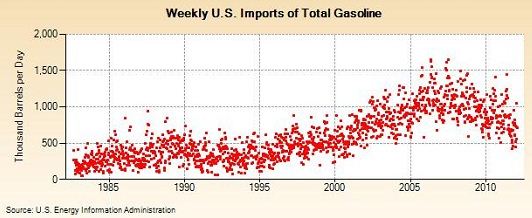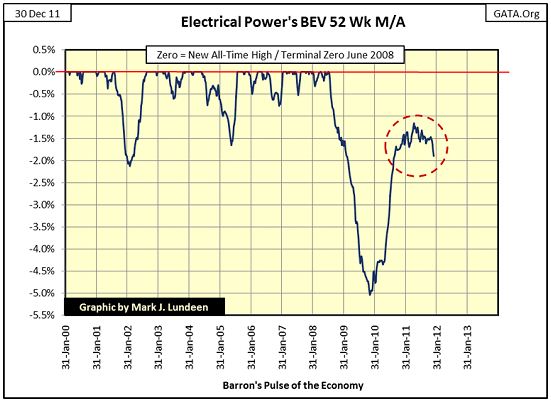It's not just gasoline consumption that's declining--petroleum and electricity consumption are also dropping. Is that indicative of economic growth?
A number of readers kindly forwarded additional data sources to me as followup on last week's entry describing sharply lower deliveries of gasoline. (Why Is Gasoline Consumption Tanking? February 10, 2012)
The basic thesis here is that petroleum consumption is a key proxy of economic activity. In periods of economic expansion, energy consumption rises. In periods of contraction, consumption levels off or declines.
This common sense correlation calls into question the Status Quo's insistence that the U.S. economy has decoupled from the global ecoomy and is still growing. This growth will create more jobs, the story goes, and expand corporate profits which will power the stock market ever higher.
Courtesy of correspondents Bob C. and Mark W., here are links and charts of petroleum consumption, imports/exports, and electricity consumption. Let's start with a chart of total petroleum products, which includes all products derived from petroleum (distillates, fuels, etc.) provided by Bob C. The chart shows the U.S. consumed about 21 million barrels a day (MBD) at the recent peak of economic activity 2005-07; from that peak, "product supplied" has fallen to 18 MBD. The current decline is very steep and has not bottomed.
This recent drop mirrors the decline registered in 2009 as the wheels fell off the global debt-based bubble. Those arguing that the U.S. economy is growing smartly and sustainably have to explain why petroleum consumption looks like 2009 when the economy tipped into a sharp contraction.
A link of interest from Mark W.: Montly U.S. Product Supplied of Finished Motor Gasoline (Thousand Barrels per Day) showing gasoline "product supplied" from 1945 to 2011. This shows gasoline has declined about 700,000 barrels per day from 2007, from 9.2 MBD to 8.5 MBD in November 2011. This represents about a 13% decline.
A number of readers wondered if gasoline imports might account for lower domestic shipments. That is a good question, and Bob C. found the answer in other EIA (U.S. Energy Information Agency) charts.
Weekly U.S. Imports of Total Gasoline (Thousand Barrels per Day) Weekly Imports & Exports of Petroleum and Other Liquids (Thousand Barrels per Day) Exports of Petroleum and Other Liquids
Here we see that of 8.5 million barrels a day of gasoline supplied, roughly 500,000 barrels are imported. In other words, the percentage of imported gasoline is modest.
The U.S. imports and exports petroleum products, but the net result is imports of around 8 million barrels a day. The U.S. imports about 10.5 MBD and exports almost 3 MBD for a net import total of 7.5 MBD. The secular decline in net imports from the 2006 top is consistent with the view that consumption has declined as a reflection of economic activity.
Mark W.also forwarded these charts of Electrical power consumption. Not only has electrical consumption never recovered the levels of mid-2008, it peaked in mid-2011 and has begun a sharp decline in late 2011.
I marked recent recessions on a long-term chart of electrical consumption to show that the deep recession of 1981-83 barely registered, while the recessions of 1990-91 and 2000-2002 are essentially noise.
That makes the secular decline from 2006 peaks all the more striking. (It is perhaps no coincidence that the housing bubble peaked in 2006-07 along with the extraction of home equity craze.)
Clearly, electrical consumption is in a downtrend with no recent historical precedent.Those claiming that U.S. growth is sustainable and the Dow is heading for 15,000 must square their rosy projections with sharply declining energy consumption. The two simply don't match up.
As a lagniappe, here is a link from correspondent Joel M. on downward revisions to shale oil estimates. This injects a note of realism in the recent euphoric depiction of the U.S. as having essentially boundless supplies of petroleum equivalents. Substantial, yes, virtually unlimited, no.
Shale gas estimates continue downward: Energy Bulletin.
Source: Of Two Minds











